#mania! centuries!
Text
hey! maybe don't say they should remove a song from the permanent setlist in the official fob discord server! maybe! that's kinda just rude! they're having fun! shut up!
#fall out boy#fob#pete wentz#patrick stump#joe trohman#andy hurley#smfs#tourdust spoilers#my teeth are bared#fr if you wanna say that please put it ANYWHERE ELSE#except like idk the boys' instagrams lmao#like fr we don't know how often the social media peeps check that! and if it gains traction?? no cause this is the same goddamn shit that#happens with all the things people don't like#mania! centuries!#folie!#stfu!! not in the ofFICIAL DISCORD SERVER#those opinions are valid but please not there. please#let fob have fun hrgh#if they wanna seek out your opinion they can#but to put it right in front of their salad??#nono
8 notes
·
View notes
Text

Mania (active during the 5th to early 4th century BCE) served as the governor of Aeolis and led armies as a vassal of the Achaemenid Empire.
Her husband, Zenis of Dardanus, had governed Aeolis for the satrap (provincial governor) Pharnabazus II. When Zenis died of illness, Mania petitioned Pharnabazus, who had initially planned to appoint a man as her husband's successor. However, Mania sought the position for herself. According to Xenophon, she approached Pharnabazus with a large retinue and many gifts, both for him and to win favor with his concubines and the influential men at his court.
Her request was granted, and Mania became “mistress of the province”. She governed effectively and led successful military campaigns. She expanded her territory, capturing the cities of Larisa, Hamaxitos, and Kolonai with a force of Greek mercenaries. Mania also accompanied Pharnabazus twice in battle. Impressed by her abilities, he rewarded her and sometimes sought her counsel.
Polyaenus praised her as an exceptional general:
“She always went to battle drawn in a chariot; she gave out orders while in action, formed her lines, and rewarded every man who fought well, as she saw he deserved. And – what has scarcely happened to any general, except herself – she never suffered a defeat.”
Mania was over 40 years old (c.399 BCE) when she was murdered by her son-in-law Meidias, who reportedly claimed that “it was a disgraceful thing for a woman to be the ruler while he was in a private station.” Meidias also killed Mania’s 17-year-old son.
He then asked Pharnabazus to grant him control of the territory, but Pharnabazus rejected his gifts, stating that “he would not wish to live if he failed to avenge Mania.” Eventually, Mania’s cities were seized by the Spartan general Dercylidas. Meidias thus gained nothing in murdering Mania.
Here is the link to my Ko-Fi. Your support would be much appreciated!
Further reading:
Polyaenus, Stratagems in war
Xenophon, Hellenica
#mania#history#women in history#historyedit#women's history#ancient history#ancient world#warrior women#female generals#Achaemenid Empire#historical figures#4th century BCE#5th century BCE
95 notes
·
View notes
Text

Elvis Presley comforting a fan who fainted at one of his concerts - 1956
140 notes
·
View notes
Text

The Dancing Mania. The black death and the dancing mania. 1888.
Internet Archive
269 notes
·
View notes
Note
why are you anti-bang the doldrums (genuinely curious btw lol)
yeah np anon<3 in my personal opinion it’s just an overhyped song at this rate like i wouldn’t say i’m anti bang the doldrums im more just genuinely sick of people saying it’s (one of) their best while it constantly overshadows songs the band has done that are way better both lyrics wise and sound wise 😭 it also doesn’t help that there’s a good chunk of people who say it’s their best solely cause it’s about “petek*y” and completely disregard, again, way better songs especially with this bracket being … doldrums vs one of fob’s most “political” songs... especially with fob being thee political bandom band yknow
#i am also a defender of centuries/abap the album and champion/mania so seeing these same kinda people fall those songs overhyped is like lo#*call#*lol#i do also just have a soft spot in this case for youre crashing cause i got her as one of my double 8balls :’-)
14 notes
·
View notes
Text
For #FlyFriday + #Invertefest:


Fly Match Box
Josiah Wedgwood & Sons, designed c. 1871-2; this example 1874
glazed earthenware
Joan Stacke Graham Collection
From the Walters Art Museum 2022 Majolica Mania exhibition.
#majolica#Majolica Mania#exhibition#museum visit#Walters Art Museum#fly#insects#matchbox#ceramics#decorative arts#English art#British art#European art#19th century art#Fly Friday#animal holiday#InverteFest#animals in art
61 notes
·
View notes
Text
. i think marys actor is the only one who really understood this assignment
#the fucking MANIA she puts into this. unparalleled#her balance of 16th century religious fanatic and like. modern bitchy teenager is incredible#she saw period fleabag/succession pastiche and said On it
5 notes
·
View notes
Text
“And because I am happy, and dance and sing, they think they have done me no injury.” [Chimney Sweeper]

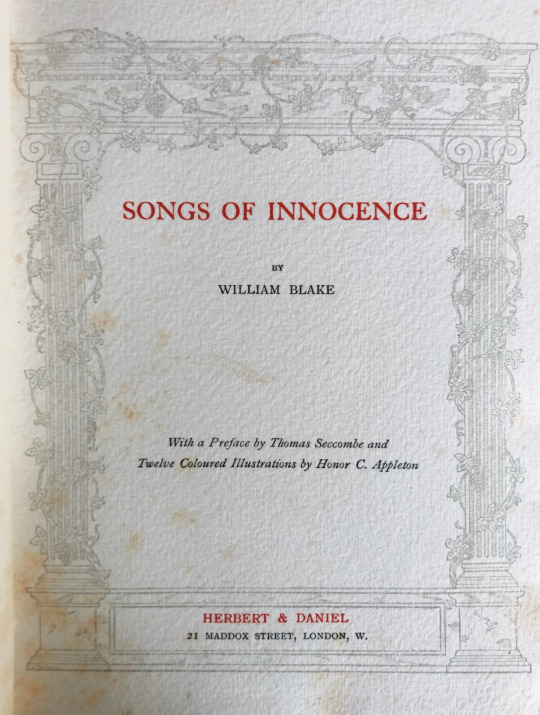


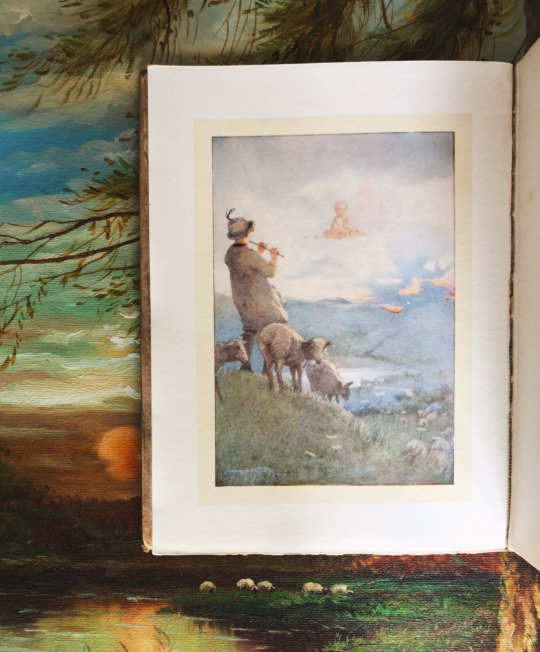



William Blake, a wonderfully exciting poet from the Romantic era, was born in London in 1757 into a working-class family with strong nonconformist religious beliefs.
Blakes believe and symbols are continously intervowen in his art. His poetic genius is trying to liberate the instinctual self and to defeat reason.
Blake's ethics formulates the originator of morality and religion through the process of liberation. Overcoming phenomenal objectness or fragmentation for the sake of a symbiotic unity of humanity within themselves and peaceful harmony of man with the world.
For every soul-wanderer, reading Blake is a spiritual gift and looking at his visualised art, a dive into cosmic seas of collective psychology.
Blake is breaking the lopsided emphasis of idealistic works. In all his gatherings of beauty, there is always a shadow of existential crisis. Even in the following work "Songs of Innocence",
the Fall off Paradise is already happening.
The violation of nature has begotten: The water is no longer clean and clear.
The eternal division of humanity from the divine cosmos as a complex interplay of an individual search for the Holy Grail, is the human idiosyncrasy.
The scepticism against rationalism and science is also playing a key role in Blake's work, as he underlines that only “The road of excess leads to the palace of wisdom.” [The Marriage of Heaven and Hell] and that "Art is the tree of life. Science is the tree of death."

Blake condemned the scientific trio of Isaac Newton, John Locke and Francis Bacon as sterile and materialistic. In this painting, (the idea of) Newton- sits on an algae covered rock, making calculations with a compass, like Urizen in Ancient of Days. He might be at the bottom of the sea, or perhaps in a black hole. He might be as Faust, signed a contract with the devil a few moments ago and then lose oneself in a cave, studying minerals and stones.
“The imagination is not a state: it is the human existence itself.”
The work "Songs of Innocence (and Experience)" is a double set of illustrated poems showing “the Two Contrary States of the Human Soul”, the child-like and pure versus the angry and disillusioned (cf. Jung's psychology and the meanings of symbols and archetypes- The shadow of the child is the senex, vice versa).
Here we also have dualistic concepts of questioning the being and the problem of theodicy: How could God tolerate the "evil" and why are bad things happening at all? If God is "the loving father" why are the humans deprived of their original goodness? Why is our world still torn between ferociousness of the few and the humble benign of the resisting ones?
Through the Fall of Man the unity between man and animal was broken (Gen. 3, 17 - 19), so the seperation is a result of the "evil", which was subsequently brought into the world.
An anthropological interpretation could be, that the "Fall of Man" or the "Original Sin" are narratives that memorize our cognitive faculty. First we had to be aware of ourselves and our environment, than we were able to distinguish between different kind of (living) beings.
The consciousness aroused questions about ethics, examining motives, motivations and shaping a guideline of virtues (Golden Rule).
But throughout the history of generating more insight- of metaphysical speculation and cosmogonic questioning of the creation of the world, it seems difficult to tell what we can really know and what are just guesses.
In modern times (but beginning with Xenophanes) the imago of God is excoriated as anthropomorphic.
But this statement shall not purport, that our human imagination is nothing less than an illusion and so less than nothing.
As Blake wisely interlinks our assumptions with the search for the first principle:
“He who sees the Infinite in all things sees God. He who sees the Ratio only sees himself only. Therefore God becomes as we are, that we may be as he is.”
Poets are the mediator dei, healing the earthly-borns from the abscence of spiritual healing. The humanity got more distrustful torwords ideals and the invisible world, but on the contrary, an individual, who always lacked deep philosophical wondering, is affected and enraptured easily through manipulative groups, who are just imitating religious sentiments, but without soul's salvation.
The search of the humankind is an eternal journey to it's cosmic roots, a balancing act between boon and bane, an entanglement of wisdom and folly: Theia Mania.
“In the universe there are things that are known and things that are unknown, and in between there are doors.”
There are some theories and perspectives dealing with the similarity between holiness and madness, found in all world religions. Mania can be the consequence of confrontation with the absolute and infinite, which is overwhelming the human reason and through overstraining, turning them mad. Mystic mania is one of my favourite motifs, it is the breath of prophecy and the ecstasy of poetizing the world of illusions, as a bridge to eternal ideas.
It is the idea of intensive love (to God and being), a radical self-denial for unification, a call for liberation.
Paradox pairs in Blakes works are continuously expanded,
"Without contraries is no progression. Attraction and repulsion, reason and energy, love and hate, are necessary to human existence."
Blake sets contrasts or he is breaking boundaries, either way he is creating and this energy of creating out of imagination, is considered by Blake as the "only life".
______________________________________________________________
Inspired by Blakes bucolic poetry and hints of a collapsing worlds, I was incited to write a small tribute with the most common motifs of the poetry in "Songs of Innocence".
The Active Evil and Passive Good by Elvin Karda
Dwelling in the arcadia
Pure daisies and cle the joyful life
Piping songs of pleasant glee
A child watches the piper
on a cload
"Pipe a song about a lamb-
Let those tones into the air
A reminiscence of a golden
land
Hidden treasures in ancient
sand!"
The piper plucks a hollow reed
fire tunes his inner song
and he stains the water clear
walking the rippling stream
along
In the evening dew
The joy is giving way to tears
When green shoots turn violet-
blue
Error is created and
eternal what is
true
The child's weeping
as meek as lamb
But vanishes and crumbles
into dust
As melody clothes the tone
in written words
Mind and body out of
touch
Energy is life and like a
fountain overflows
Active evil is better
than
told with bad intent
passive good
#1910#antiquarian book#world literature#19th century literature#literature#book cover#books#reading therapy#William Blake#romanticism#romantic epoch#romantic literature#poetry#poem#the poet#love as religion#holy mania#heaven and hell#cosmogonic questioning#theodicy#sense of life#between utopia and dystopia#original sin#theories of conscience
18 notes
·
View notes
Text
champion is a good song in fact. actually. I said it
#i think it just suffers from the same thing as centuries which is#corny song-that-plays-for-an-nfl-game chorus#but like. every other lyric and part of the song is soooo fucking fire and soo good and interesting#the opening lines to champion ALONE just drive me insane#ive been listening to mania nonstop the last 24 hours.#txt
9 notes
·
View notes
Text

behold !! a drawing of centuries patrick without centuries lyrics :P
#fall out boy#fall out boy fanart#centuries patrick#patrick stump#centuries#centuries mv#myart#..guess whos fixated on him and by extension gets way too giddy when roman history is brought up#sigghh... this guy.#God he is so pathetic wet cat#wilson is his song idc that mania was made after abap#i tried... two different painting styles. one which enraged me
13 notes
·
View notes
Text
whoa whoa whoa. I don't know when exactly it is but I think my 10 year anniversary of being a fall out boy fan is coming up. oh my god
#not sure if I'm just happy to have spent my time with this band or if I feel old now. I'm not even 21 yet hello#both?#fall out boy#Whaaaaat#Anyways. I became a fan through centuries. Not super early or a long time after so within like 6 months of its release?#And I slowly listened to more of their stuff#I was a fan *by* 2016 for sure cause I have record of it#Plus I was here pre mania teasing#I think it feels like such a short time because I've only been around for 2 album release 0.o#no shade intended ily fob#I can't remember if I was a fan/a big enough fan when I saw big hero 6 in theaters#Hmmm#I wanna say it must've been around the time uma thurman came out or something#Lets go with like abaps birthday or something. That'll be my 10 year#Wow what the Fuck lol
5 notes
·
View notes
Text
okay time to make your predictions (only for Pete to lurk here and thwart them, hi mr. wentz, please log off tumblr):
What slots would become The [album] Rotating Slot Of Death, assuming they kept it mostly within album like we've seen with TTTYG, IOH and FÀD?
#i think 16c is their best bet for swappable futct as much as i would want to hunt them down for sport almost as badly as with headfirst#and uma for abap bc i dont see them swapping out centuries#between giving up the harmonies+logistics of the piano is onstage and pete's flamethrower#i think they'd forgo the flamethrower but mskwyditd is also encore so idk#and ofc there's only one option for mania but also the piano is onstage but also young and menace piano version is a powerful demon#and honestly for smfs i live in fear that the most swappable song would be hmlag (bc if they swap out fake out everyone kills them)#and that means practically no warning 1st plane hitting before the 8 ball hits#overall it seems like there's better planning for pre hiatus slots of doom so i do genuinely think we're gonna lose her (all16c) some day#so they can play something more fucked up from futct#but idk about the post hiatus ones#also this specially with the assumption is just for funsies plenty of other ways to structure rotating slots too#like similar moods to keep the narrative going and ofc album siblings trend towards more similar vibes#tourdust#fob
2 notes
·
View notes
Text
The fob concert was so goooooood it was so good so good im so sad its over like genuinely just sad. Because it was sooo good man. I wish it lasted forever
#they played headfirst slide which i was hoping for!!!!#i was hoping for church and hold me tight but they didnt play any mania at all#they went sooo off with centuries#patricks voice is SO incredible and i loooovwd the way pete constantly hopped around#rhe crowd was very mild which i was super sad about :(#their stage presence was so good they deserved more
1 note
·
View note
Text
the major difference between fall out boy and certain other major "emo" bands is that fall out boy's more popular songs are actually really good and certain other major emo bands have high hopes in their discography
#no skips ANYWHERE#you could tell me you know some fall out boy songs. play the most popular ones. and i would still love it#if you tell me you want to play patd and you play fucking high hopes i will jump out of the car#even like. i dont like this is gospel. mona lisa is okay? iwsnt is my least favorite song off afycso#I CANT SAY THAT ABOUT ANY FALL OUT BOY SONGS#'whats ur least favorite song off folie a deux' buddy theyre all fighting for number 1#fall out boy only has skips when im trying to be happy and what a catch donnie comes up sorry#osorry i really love fall out boy#ptv also has no skips but theyre not. they dont have overplayed songs??#not as far as i know at least#sugar were going down. thanks for the mmrs. i dont care. HELL EVEN IMMORTALS AND CENTURIES. NO SKIPS#and yes i am a mania enjoyer. i have taste
6 notes
·
View notes
Text
istg im trying unfollow old blogs but the first ever fall out boy blog I followed stopped posting 1/2 a year after mania dropped
#i know i was a mania hater but GOT DAMN#the fact that i got tumblr bc of how much i liked fob is also crazy#i legit dont know anyone irl who actually likes them. not just centuries or sugar y'know
0 notes
Text
For #MonkeyDay:
19th-century majolica monkeys! From the 2022 Majolica Mania exhibition at The Walters Art Museum:
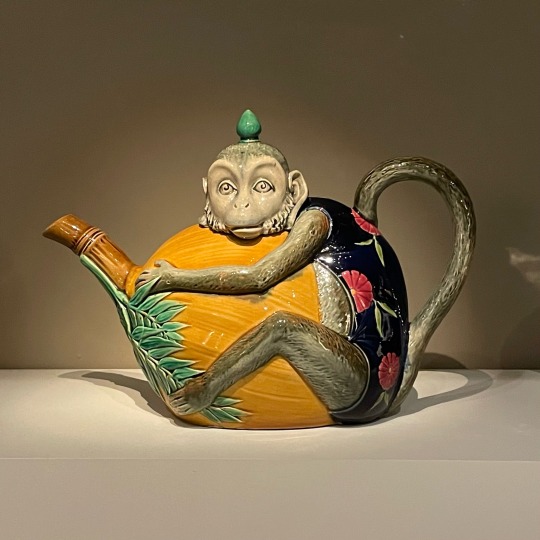
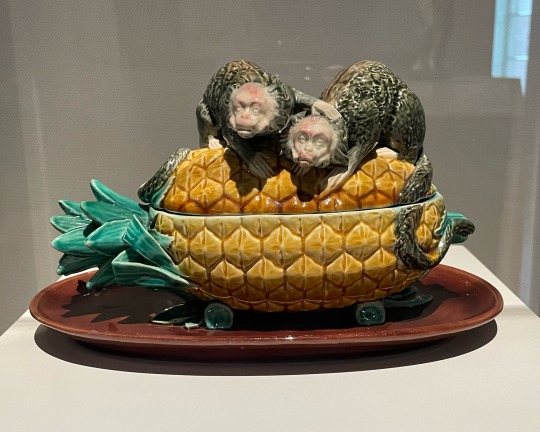
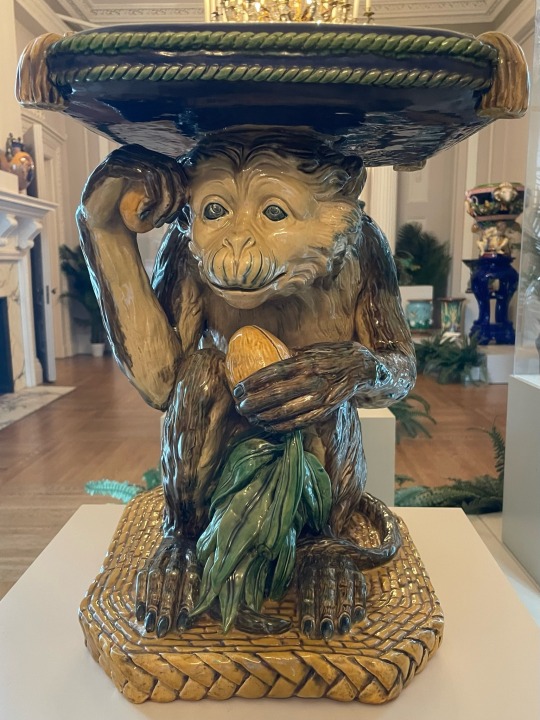
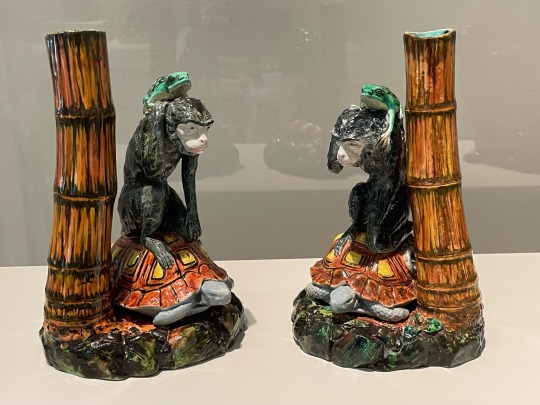
1. Monkey Teapot, Mintons Ltd., designed c. 1873, this example 1894
2. Monkey Inkstand, Minton & Co., design registered 1872
3. Monkey Garden Seat, Minton & Co., designed c. 1855, this example 1867
4. Vases (Frog, Monkey, Tortoise), Worcester Royal Porcelain Co., c. 1876, attributed to James Hadley (British, 1837–1903), designer
#animals in art#european art#museum visit#19th century art#monkey#majolica#ceramics#pottery#British art#Walters Art Museum#exhibition#Majolica Mania#Monkey Day#animal holiday
10 notes
·
View notes